Crosstalk between tumor cells and microenvironment
We have been studying cooperation of oncogenic pathway and host responses in gastric and intestinal tumorigenesis. We have constructed a series of mouse models and have examined the role of Wnt, PGE2, inflammation, and other factor(s) in tumorigenesis.
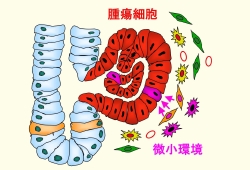
Gastric tumorigenesis by activation of both Wnt and PGE2 pathways
Infection with H. pylori is tightly associated with gastric tumorigenesis, which induces PGE2 pathway. COX-2/PGE2 pathway has shown to be important for tumorigenesis. On the other hand, Wnt signaling is one of the majour causes for gastric tumorigenesis.
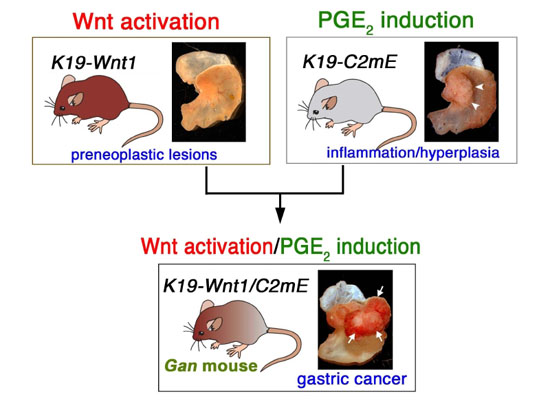
We constructed transgenic mice, K19-Wnt1 expressing Wnt1, and K19-C2mE expressing both COX-2 and mPGES-1 in gastric mucosa. K19-Wnt1 mice develop small preneoplastic lesions in the stomach, while K19-C2mE mice develop metaplastic hyperplasia-associated with inflammatory responses. Importantly, K19-Wnt1/C2mE double transgenic mice developed gastric adenocarcinoma, indicating that activation of both Wnt and PGE2 pathways is responsible for gastric tumorigenesis. Using this model (Gan mice), we have demonstrated that bone marrow-derived cells and myofibroblasts are activated by tumor epithelial cells, resulting in enhancement of angiogenesis. Moreover, EGFR ligands and ADAM family proteases are induced in the PGE2-induced inflammatory environment.
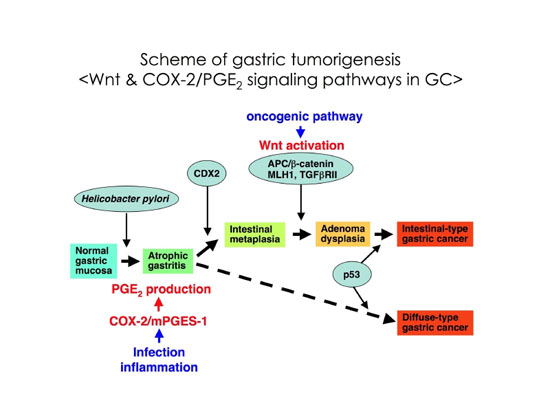
Promotion of Wnt signaling by macrophage-derived TNF-α
We constructed Wnt reporter gastric cancer cells that express GFP in response to Wnt signaling. Notably, reporter cells showed increased GFP intensity when treated with conditioned medium of activated macrophages, indicating that macrophages express soluble Wnt promoting factors. Among proinflammatory cytokines, we found that TNF-alpha can directly activates Wnt signaling of gastric cancer cells.
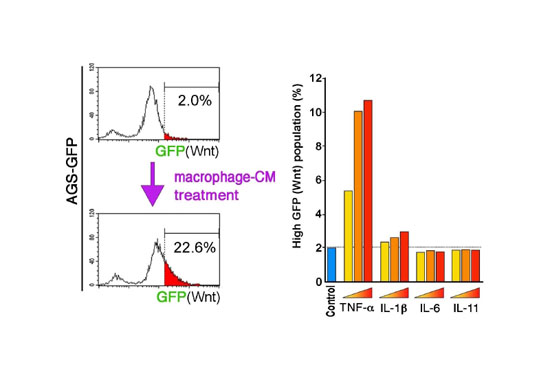
Moreover, K19-Wnt1 mice develop Wnt-activated gastric tumors when infected with Helicobacter felis, suggesting that infection-associated inflammation promotes Wnt activity, which contributes to tumorigenesis. Accordingly, it is possible that Wnt activation at basic level is not sufficient for tumorigenesis. If Wnt is activated in H. pylori-infected and inflamed stomach, tumor cells may proliferate to form gastric tumors.
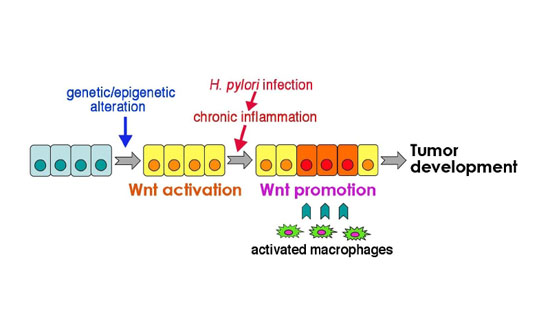
(Oguma K, et al, EMBO J, 2008)
(Oshima H, et al, Cancer Sci, 2009)
(Oguma K et al, Future Oncol, 2010)
Induction of tumor suppressor Sox17 in gastric tumors
Sox17 is a member of SRY transcription family. It has been shown that Sox17 represses Wnt signaling and downregulated in colon cacner, suggesting that Sox17 is a tumor suppressor. However, we found that Sox17 is strongly induced in mouse gastrointestinal tumors. Moreover, Sox17 expression is also induced in human benign gastrointestinal tumors. It is therefore possible that Sox17 is induced at early stage of tumorigenesis, and then downregulated at later stage.
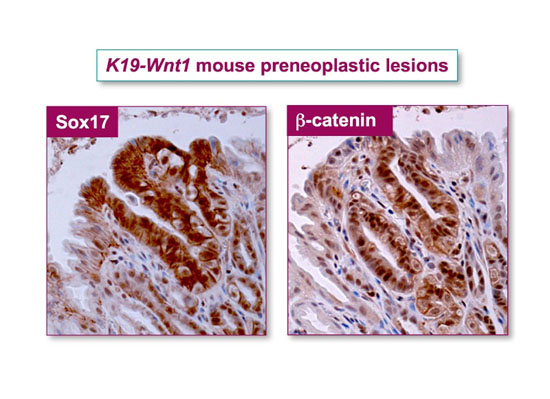
We constructed K19-Sox17 transgenic mice and crossed with K19-Wnt1/C2mE (Gan) mice that are gastric tumor mouse models. Interestingly, we found that tumor size reduced in compound transgenic mice, possibly caused by repression of Wnt signaling through Sox17 overexpression. It is thus possible that Sox17 protects tumors from malignant progression at early stage. We are now trying to elucidate the function of Sox17 in gastrointestinal tumorigenesis by construction of mouse models.
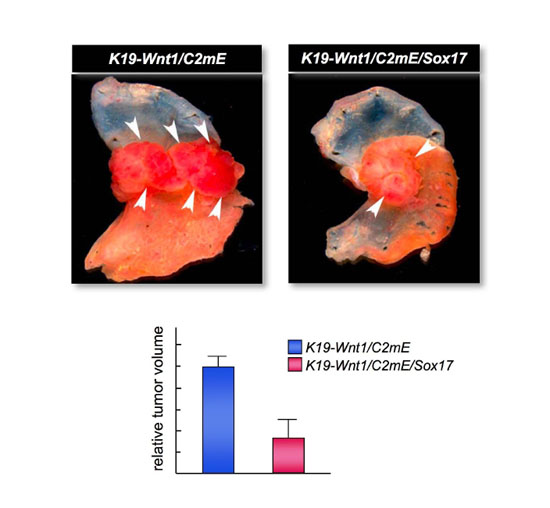
(Du YC, et al, Gastroenterology, 2009)
Cooperation of bacterial infection and PGE2 in gastric tumorigenesis
It has been shown that normal microflora play an important role in homeostasis of intestinal mucosa. Although bacterial counts in the stomach are very low because of low pH, gastric tumorigenesis was significantly suppressed in germfree Gan mice. Moreover, infection of H. felis to the germfree Gan mouse stomach induced tumors again. Accordingly, it is possible that bacterial infection is important for gastric tumorigenesis.
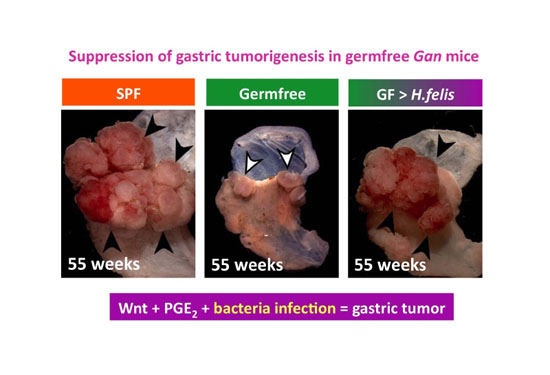
Importantly, macrophage infiltration was suppressed in germfree Gan mouse stomach, although PGE2 production is increased. Therefore, bacterial infection and PGE2 may cooperatively induce macrophage recruitment. CCL2 is involved in such macrophage infiltration. Importantly, macrophage depletion in Gan mouse tumors by treatment with clodronate liposome caused degeneration of tumor stromal and epithelial cells, suggesting an importnat role of macrophages in gastric tumorigenesis.
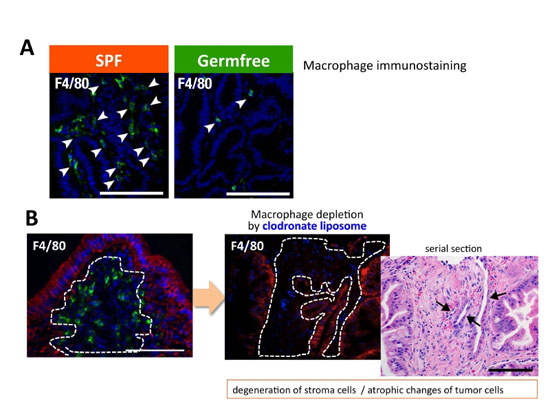
(Oshima H, et al, Gastroenterology, 2011)


 HOME
HOME